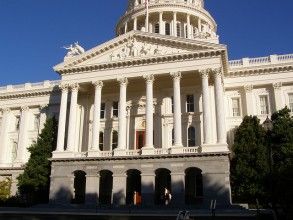Democratic supermajority won’t stop intraparty fighting, but may grow center
by Matt Fleming | November 8, 2016 5:01 am
 Democrats on Election Day have a very real chance at winning a two-thirds “supermajority” in the California Legislature. While that would be a major disaster for Republicans politically — if it were to happen — it would likely have little effect on the legislative process if recent history is any guide.
Democrats on Election Day have a very real chance at winning a two-thirds “supermajority” in the California Legislature. While that would be a major disaster for Republicans politically — if it were to happen — it would likely have little effect on the legislative process if recent history is any guide.
In fact, most of the larger defeats over the last year or so have been due to intraparty fighting. It was mostly moderate Democrats who last year weakened[1] landmark environmental legislation, SB350. This year, they struck again when they initially killed a measure expanding overtime protections for farmworkers.
In those instances, the moderates formed a majority with Republicans, which means both share the blame (or praise). But while Republicans often get blamed, the truth is that there aren’t enough Republicans to block most votes. It was Democrats solely who twice sank a Democratic bill expanding parental leave — once by a Democratic majority on a policy committee (possibly due to a grudge[2]) and then a revived version was vetoed by the Democratic governor, Jerry Brown.
What it takes
Democrats need to flip two seats in the Assembly and one in the Senate to get a supermajority — and it’s possible. With a supermajority, Democrats would have the power to increase taxes, override gubernatorial vetoes (which rarely happens) and change legislative rules without Republican votes.
Most bills require a simple majority, which means Democrats have more than enough votes most of the time. But a united bloc can be elusive in a state as large and diverse as California, where different members have different needs based on their districts.
“Taxes and rules, that’s about it,” said Steve Maviglio, a prominent Democratic strategist in California. “And it’s rare that either party is a monolith. If Democrats win in competitive districts, they often will get a pass on tough votes anyway.”
They don’t always get a pass though. For example, Assemblywoman Cheryl Brown, an Inland Empire Democrat, faces tremendous opposition[3] from a more liberal opponent in her re-election bid, largely due to votes that have riled environmentalists. Just as the opposing party tries to weed out incumbents in moderate districts, the more ideologically “pure” try to weed out centrists within the party.
The Democratic dividing line
The moderate caucus is mostly people of color, like Assemblywoman Brown. According to Mike Madrid, a Republican consultant who specializes in Latino issues, economic issues will be the dividing line in the Democratic Party — between moderate Democrats of color in blue-collar districts and wealthy, coastal liberals (mostly white and particularly in the Bay Area), who have outsized influence over policy in the state.
For example, the farmworker overtime bill was largely supported by members along the coast[4], despite most of the farms being inland. The bill was killed in the summer by the Republican/Moderate coaltion, but enough moderates (and one Republican) switched to support in the last days of the legislative session.
“There’s a growing economic argument that is going to be made as we grow poverty, as income inequality continues to divide, as housing affordability becomes more and more out of reach and as our education program continues to disproportionately hurt kids of color — all of these are major substantive policy issues, which are fundamentally about the economy — there’s a growing disparity between white progressives and moderate Democrats of color,” Madrid said. “That’s going to be the dividing line.”
Bad for Democracy?
If Republicans do get relegated to superminority status, their reduced role could have greater implications for the fate of Democracy.
“It’s not good for the health of a two-party system, since it marginalizes Republican members of the respective chambers,” said Mark Petracca, chair of the Department of Political Science at UC Irvine. “This marginalization means less buy-in to the policy making process and can result in even greater political polarization.”
Opportunity for Republicans
No matter how many Republicans are left in the Legislature after Tuesday (after all, they may hold or pick up seats as well), there’s an opportunity to regain some influence over policy making. They can work with the moderate Democrats on issues like education reform and economic development and improvement, as the strength of the moderates is proportionate to the size of the Republican caucus. They need each other, at least on certain issues, according to Madrid.
“But they’re going to have to get out of their ideological box and come up with new and better ideas that address a changing California,” Madrid said of Republicans.
Veto overrides
While a supermajority does give one party in the Legislature the power to override a gubernatorial veto, it’s not likely to happen, at least not while there’s a Democratic governor. According to the One Voter Project[5], Republicans did propose the last attempted veto override, in 2012, which failed. The last successful override was in 1979, when Jerry Brown was governor the first time.
- weakened: http://www.mercurynews.com/2015/09/26/moderate-assembly-democrats-emerge-as-powerful-pro-business-force/
- possibly due to a grudge: http://calwatchdog.com/2016/06/23/twitter-tells-story-legislative-retaliation/
- tremendous opposition: http://calwatchdog.com/2016/07/19/battleground-2016-top-legislative-races/
- largely supported by members along the coast: http://www.sacbee.com/news/politics-government/capitol-alert/article98832562.html
- One Voter Project: http://www.onevoter.org/2012/01/19/blakeslee-attempts-veto-override/
Source URL: https://calwatchdog.com/2016/11/08/democratic-supermajority-wont-stop-intraparty-fighting-may-grow-center/